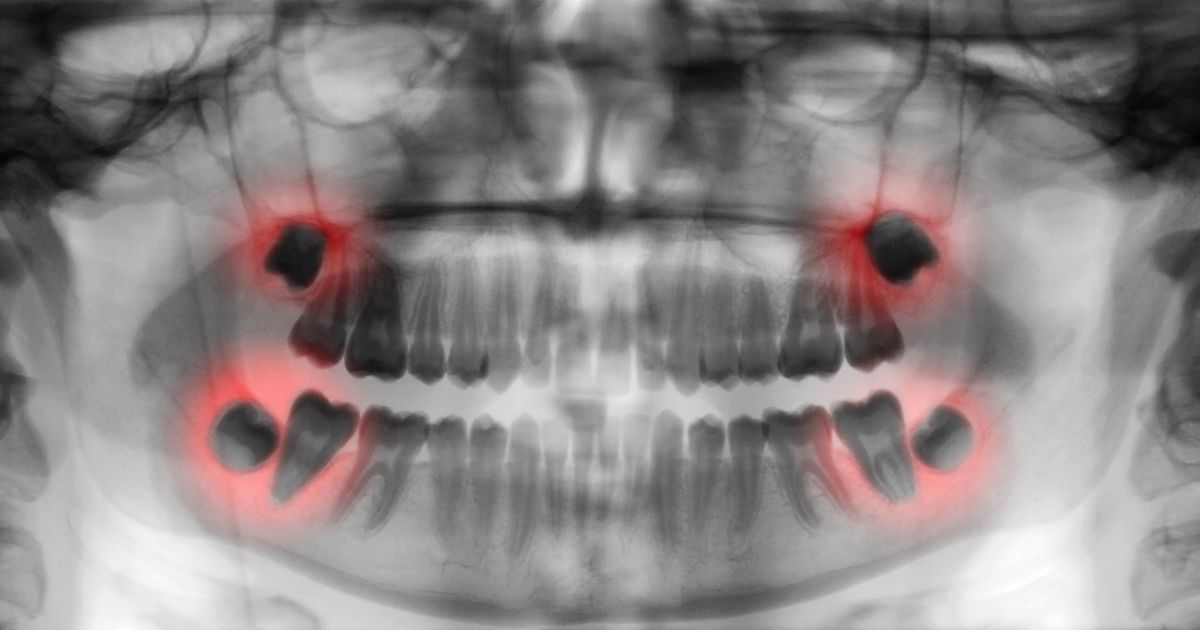Due to their location, wisdom teeth are more difficult to clean, making them more susceptible to decay and gum disease that can spread throughout the mouth. Their location also tends to cause overcrowding, misalignment, and damage to other teeth, increasing your risk of developing cavities, infections, and gum disease.
Wisdom teeth generally cause issues for most people at some point in their lives. Though some patients do not experience problems with wisdom teeth until their 30s, the majority develop issues in late teens to early adulthood. Wisdom tooth extraction and recovery is easier the younger you are when surgery is involved.
During the evaluation appointment, your oral surgeon will determine the size and position of your wisdom teeth and recommend the best option, including the number of teeth extracted at one time. Recent studies have shown that over 80 percent of surgeons recommend extracting all four wisdom teeth during one surgery.
Patients commonly wonder whether all four wisdom teeth should be removed at the same time or spaced out over time in multiple procedures. Many surgeons typically recommend removing all four at the same time for several reasons, such as:
- Quadruple extraction is safer: Even seemingly healthy wisdom teeth without pain or other symptoms could be masking underlying problems. Most individual’s mouths do not have enough room for wisdom teeth, and they can cause a whole host of problems. Lack of space causes many patient’s wisdom teeth to remain under the surface and become impacted, which can damage adjacent teeth and their roots, and cause misalignment, cysts, infections, pain, and swelling. Additionally, undergoing anesthesia is much safer with one surgery rather than multiple surgeries.
- One procedure is more convenient: The recommended recovery time following wisdom teeth extraction is at least 72 hours and often longer in more complex surgeries. The recovery time is the same for one or four teeth, and most people do not have the schedule to fit in four weeks of recovery time in order to space out extractions. There is also a level of pain and modified diet involved, which most patients do not want to endure multiple times.
- Comfort is not affected: Some patients are concerned that removing four teeth at once is more painful than one. Generally, the number of teeth extracted does not affect the level of discomfort or pain experienced.
- It is more affordable: Multiple surgeries means multiple expenses, including multiple office visits, more surgical costs, and up to four rounds of anesthesia costs. Paying for only one surgery is more cost-effective than paying for up to four.
What Happens if I Do Not Have My Wisdom Teeth Removed?
Not extracting wisdom teeth is sometimes permissible, and it is your decision as to whether you want to have them removed or not. However, wisdom teeth that are not removed can damage adjacent teeth and roots, develop tumors, cysts, abscesses, and cavities that cannot be fixed, and lead to serious infections and other diseases.
South Jersey Oral Surgeons at Lanzi Burke Oral & Maxillofacial Surgeons Perform Wisdom Teeth Extraction Surgery
At some point in early adulthood, wisdom teeth begin to develop and emerge, frequently causing unhealthy and painful issues. One of our South Jersey oral surgeons at Lanzi Burke Oral & Maxillofacial Surgeons can evaluate your wisdom teeth and determine which surgical option is best for you. Call us at 856-582-4222 or contact us online to schedule an initial consultation. Located in Washington Township, Haddonfield, and Woolwich Township, New Jersey, we are dedicated to helping patients throughout South Jersey.


